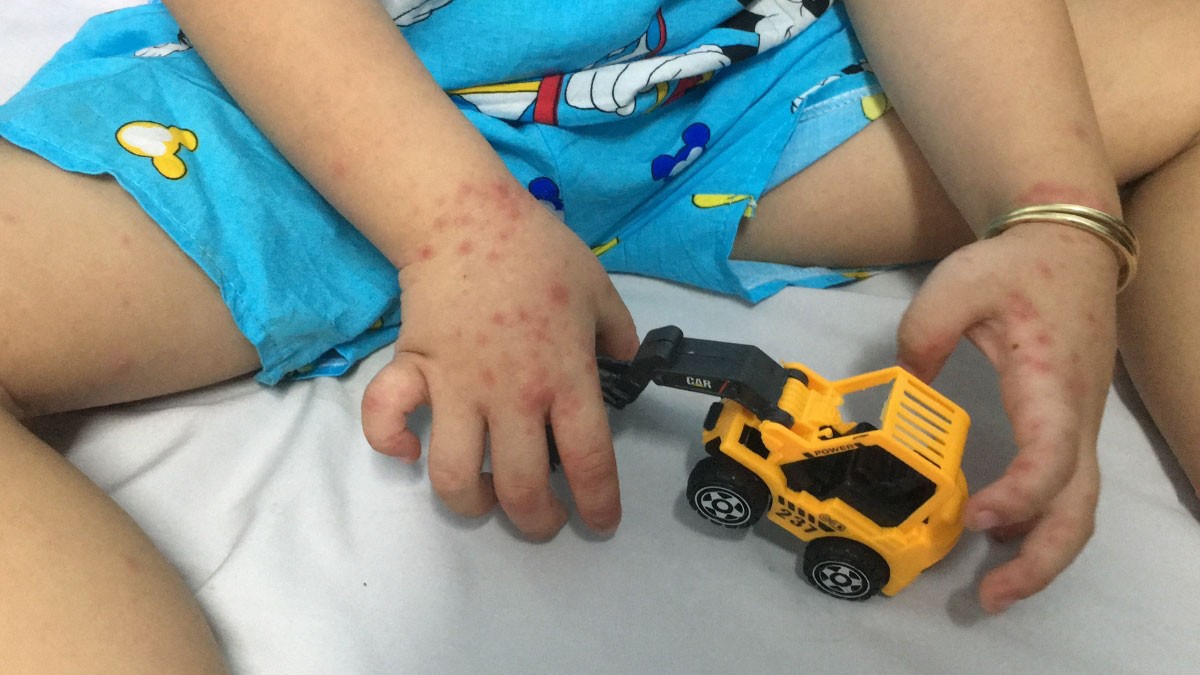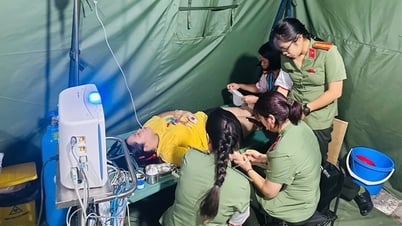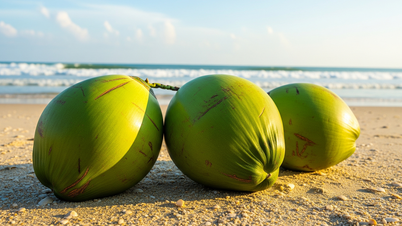 |
| Most children with hand, foot and mouth disease have mild symptoms. (Source: SK&DS) |
Severe hand, foot and mouth disease, dangerous complications
At the Tropical Disease Center - National Children's Hospital, since the beginning of the year, there have been more than 100 cases of children hospitalized due to hand, foot and mouth disease, with 37 cases hospitalized from March 13-29 alone.
Most cases are mild. However, in some cases, the disease progresses rapidly, becomes severe, and causes dangerous complications.
Hanoi Department of Health said that so far, the city has recorded 248 cases of hand, foot and mouth disease (while in the same period last year there were only 2 cases).
According to the World Health Organization (WHO), hand, foot and mouth disease is a common disease in many Asian countries and occurs every few years in many different regions of the world.
According to the Department of Preventive Medicine, Ministry of Health , in Vietnam, the number of cases of this disease tends to increase from March to May and from September to December. The disease is most contagious in the first week after a patient is infected and can last for several weeks because the virus resides in feces.
Who is susceptible to hand, foot and mouth disease?
Hand, foot and mouth disease is mainly caused by Coxsackievirus A16, which has few complications and usually resolves on its own. However, the disease can also be caused by viruses from the Enterovirus group, including Enterovirus 71 (EV71), which has many dangerous complications and can lead to death.
Hand, foot and mouth disease mainly occurs in children under 10 years of age, usually in children under 5 years of age. The younger the child, the more severe the symptoms.
However, anyone who has never had the disease is at risk of infection through contact with contaminated objects or surfaces touched by an infected person, but not everyone infected with the virus will show symptoms of the disease.
Children are at higher risk of contracting the virus and getting sick because they have weaker immune systems than adults. Most adults are immune, but cases of teenagers and adults getting infected with the virus are not uncommon.
Pregnant women need to prevent the disease and should not come into close contact with infected people because they can be infected and transmit the virus to their children right before or during birth.
It is worth noting that a person can be infected with hand, foot and mouth disease many times because each time infected, the body only produces antibodies to a certain type of virus.
Therefore, even if infected, the patient can still get sick again if infected with another virus in the Enterovirus group.
What to do to prevent hand, foot and mouth disease?
There is currently no specific treatment for hand, foot and mouth disease. When sick, patients should drink plenty of water and can take medication to treat symptoms such as reducing fever or pain from ulcers.
The risk of infection can be reduced by regular hygiene measures and prompt medical intervention when the patient has severe symptoms.
To actively prevent and minimize the impact of hand, foot and mouth disease on health, especially children, the Department of Preventive Medicine, Ministry of Health strongly recommends that people proactively implement the following disease prevention measures:
Personal hygiene
Wash hands regularly with soap under running water many times a day (both adults and children), especially before preparing food, before eating/feeding children, before holding children, after using the toilet, after changing diapers and cleaning children.
Food hygiene
Food for children must ensure adequate nutrition; cooked food and water; eating and drinking utensils must be washed thoroughly before use (preferably soaked in boiling water); use clean water in daily activities; do not feed children; do not let children eat with their hands, suck their fingers, or suck on toys; do not let children share napkins, handkerchiefs, eating and drinking utensils such as cups, bowls, plates, spoons, and toys that have not been sterilized.
Clean toys and living areas
Households, kindergartens, and home childcare providers need to regularly clean surfaces and objects that are in daily contact such as toys, school supplies, doorknobs, stair handrails, table/chair surfaces, and floors with soap or common detergents.
Collection and disposal of children's waste
Use hygienic toilets, children's feces and waste must be collected, treated and dumped into hygienic toilets.
Early detection monitoring
Children must be regularly monitored for their health to promptly detect, isolate, and treat cases of illness, avoiding the spread of disease to other children.
Isolate and treat promptly when the disease occurs
Nursery schools, kindergartens, child care groups and households with children under 6 years old need to proactively monitor their children's health to promptly detect and take them to medical facilities for timely treatment.
Sick children must be isolated for at least 10 days from the onset of the disease. Children showing symptoms of the disease must not be allowed to attend class or play with other children. Children must be taken immediately to medical facilities for examination and treatment.
 | UK detects dangerous radioactive material at Heathrow International Airport, counter-terrorism unit steps in British police said on January 15 they had arrested a man in an anti-terrorism investigation after discovering ... |
 | North Korea claims to have launched four missiles, demonstrating its nuclear force is 'ready for war', EU says dangerous On February 24, North Korea confirmed that it had conducted a strategic cruise missile launch exercise in the early morning of February 23 to demonstrate... |
 | Vietnamese artists join hands with UN Women to raise awareness about gender-based violence Within the framework of The Orange Team 2023 program, the United Nations Entity for Gender Equality and the Empowerment of Women (UN ... |
 | Ministry of Health: Strengthen measures to prevent the risk of bird flu infection that can spread to humans According to the Ministry of Health, our country always has the potential risk of bird flu infection to humans, especially in weather conditions... |
 | Warming waters reduce extinction risk for rare hard-shelled turtle Experts say warmer waters are more beneficial for loggerhead turtles - the world's largest hard-shelled turtle - which are... |
Source



![[Photo] Images of the State-level preliminary rehearsal of the military parade at Ba Dinh Square](https://vphoto.vietnam.vn/thumb/1200x675/vietnam/resource/IMAGE/2025/8/27/807e4479c81f408ca16b916ba381b667)
![[Photo] National Assembly Chairman Tran Thanh Man holds talks with New Zealand Parliament Chairman](https://vphoto.vietnam.vn/thumb/1200x675/vietnam/resource/IMAGE/2025/8/28/c90fcbe09a1d4a028b7623ae366b741d)



























































































Comment (0)